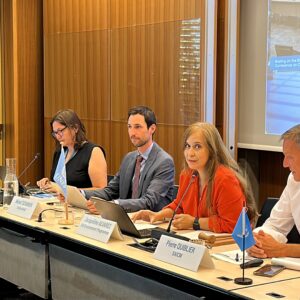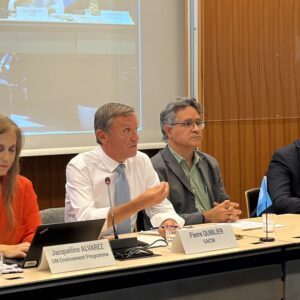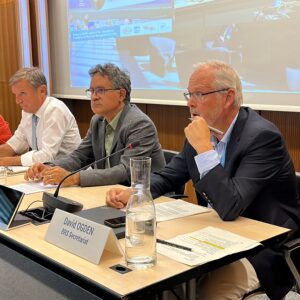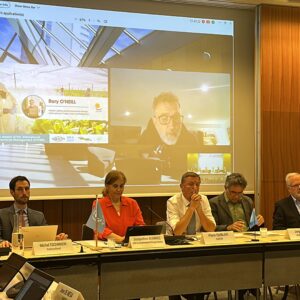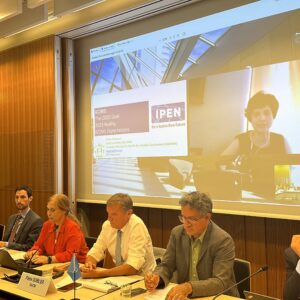Event Conference
Briefing on the 5th session of the International Conference on Chemicals Management (ICCM5)
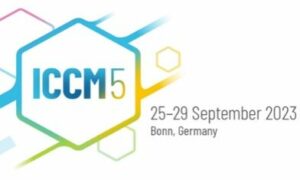
24 Aug 2023
11:00–12:30
Venue: International Environment House II (Chemin de Balexert 7-9, Châtelaine) & Online | Webex
Organization: Geneva Environment Network, Strategic Approach to International Chemicals Management
The 5th session of the International Conference on Chemicals Management (ICCM5), organized by UNEP under the presidency of the government of Germany, will take place from 25 to 29 September 2023 at the World Conference Center Bonn (WCCB), Germany. This event, taking place one month ahead of the intergovernmental meeting, provided updates on preparations and the way forward.

About this Event
The 5th session of the International Conference on Chemicals Management (ICCM5), organized by UNEP under the presidency of the government of Germany, will take place from 25 to 29 September 2023 at the World Conference Center Bonn (WCCB), Germany. The event includes a High-level Segment on 28 and 29 September 2023. In the margins of ICCM5, a programme of side events displaying broad sectoral linkages to chemicals and waste management will be convened.
The Conference will be preceded by the resumed fourth meeting of the Intersessional Process considering the Strategic Approach and the sound management of chemicals and waste beyond 2020 (IP4.3) on 23 and 24 September 2023 and regional meetings on 21 and 22 September 2023.
ICCM undertakes periodic reviews of the Strategic Approach to International Chemicals Management (SAICM), a global multi-sectoral and multi-stakeholder policy framework on the sound management of chemicals across the lifecycle.
This event, taking place one month ahead of the intergovernmental meeting, provided updates on preparations and the way forward.
Speakers
By order of intervention.

Anita BREYER
President, 5th session of the International Conference on Chemicals Management (ICCM5) | Germany

Pierre QUIBLIER
Coordinator, Officer in Charge, SAICM Secretariat

Shannon LISA
Global Focal Point, Chemicals and Waste Youth Platform, Major Group for Children and Youth

Jorge OCANA
Chair, IOMC | Manager, Chemicals and Waste Management Programme, UN Institute for Training and Research (UNITAR)

Tessa GOVERSE
Principal Officer, Science-Policy Panel on Chemicals, Waste and Prevention of Pollution, UNEP

David OGDEN
Deputy Executive Secretary (OiC), Basel, Rotterdam and Stockholm Conventions Secretariat

Servet GOREN
Director, International Affairs, Cefic | International Council of Chemical Associations (ICCA)

Rory O'NEILL
Labour and Occupational Health Adviser, International Trade Union Confederation

Susan WILBURN
Senior Sustainability Consultant, Health Care Without Harm

Gohar KHOJAYAN
Communications Specialist, Armenian Women for Health and Healthy Environment and IPEN Member
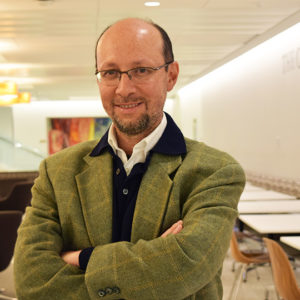
Marcos ORELLANA
UN Special Rapporteur on Toxics and Human Rights

Michel TSCHIRREN
Head, Global Affairs, Federal Office for the Environment, Switzerland

Jacqueline ALVAREZ
Head, Chemicals and Health Branch, UN Environment Programme | Moderator
Summary
Opening
Jacqueline ALVAREZ | Chief, Chemicals and Health Branch, UNEP | Moderator
Explaining what the international community is doing to achieve the sustainable and sound management of chemicals and waste is a hard task, inviting everyone to reflect on whether what is being done is enough to reach this goal. Although individual action offers a valuable contribution to the challenge, what matters is collective action. The 5th session of the International Conference on Chemicals Management (ICCM5) represents a concrete change to demonstrate the impact collective action can have, I thus invite all participating stakeholders to take brave and bold decisions at the upcoming meeting to move the sound management of chemicals agenda towards its achievement.
Anita BREYER | President, 5th session of the International Conference on Chemicals Management (ICCM5) | Germany
- It is a privilege to brief the Geneva Environment Network on this momentous milestone and collective mission to ensure the safe management of chemicals and waste.
- The Fifth International Conference on Chemicals Management, ICCM5, or World Chemicals Conference, comes at a pivotal time, where pollution is recognized as one of the top three ecological threats to life on earth together with climate change and biodiversity loss, as a significant part of pollution is caused by the irresponsible or improper handling of chemicals and waste
- The Conference, jointly organized by UNEP and the Government of Germany is scheduled from 25 to 29 September at the World Conference Centre in the city of Bonn. It will mark an unprecedented gathering of high-level policymakers, intergovernmental organizations, civil society including youth groups, industry actors and experts from across the spectrum – from labor to health, and from agriculture, industry, environment, and nature conservation to science. Together, we are committed to laying the political groundwork for ambitious commitments that tackle the far-reaching impacts of chemicals and waste amidst the complexities of our present moment.
- The crucial element for this political groundwork is to create visibility for the importance of sustainable chemical management. All sectors need to understand their respective responsibilities for creating a chemical safety world. It is not a specialist issue, the action of virtually everyone is needed.
- On September 28 and 29 September, the High-Level Segment will be convened with the view of mobilizing international commitments to the chemicals and waste agenda and to make everyone understand their own responsibility. The conference’s Thematic Roundtables will provide a platform for dialogues among stakeholders, crucially addressing the ways and means of how to concretely implement the new framework instrument.
- With just one month left until we meet, time is indeed of the essence. Our collective dedication has brought us far, yet our work on the framework instrument remains unfinished. We will convene in Bonn to complete this task, uniting our expertise and vision, in spite of the time limit to find a common language and agreement.
- With this, I call upon all involved stakeholders to collaborate constructively and dimonstrate willingness in finidng a common ground and solutions for the new global framework. This common ground is our common message tothe world on the urgency and responsibility on chemicals management.
- I am convinced that our combined efforts will land with an ambitious global framework that addresses the pollution pillar of the triple planetary crisis, hence calling on the responsibility of high-level political stakeholders to act now with determination. The time to ignore to ignore this task and refer it to someone else is over.
- The momentum surrounding this framework is palpable, riding on the heels of recent monumental international meetings – conferences of the Parties to the Basel, Rotterdam, and Stockholm conventions, the World Health Assembly in Geneva, the Ministerial Conference on Environment and Health in Budapest, and the African Ministerial Conference on the Environment in Addis Ababa. It is clear that the journey we are embarking on in Bonn is part of a larger tapestry of global progress.
- As the President of this process and as a representative of the German Government, we would appraciate active participation in the negotiations. We need to have high-level and broad participation from all sectors to raise awareness and the responsibility that lies with all of us to achieve this task. We look forward to seeing you all in Bonn.
Update on Preparations
Pierre QUIBLIER | Coordinator, Officer in Charge, SAICM Secretariat
- In the words of the ICCM5 President concluding the latest intercessional process meeting held in Nairobi from the end of February to the beginning of March 2023, “ While more work is needed, I feel stimulated by this “Nairobi spirit” and more than ever I am convinced that collectively we will create a powerful International framework that further generates multisectoral and stakeholders commitment and collaboration to deliver concrete actions integrated across sectors and value chains.”
- At their meeting in Nairobi, delegates welcomed the revised Consolidated text presented on 3 March 2023 as a significant achievement but agreed to the IP co-chairs proposal to re-adjourn the intercessional process meeting and reconvene two days before ICCM5 in Bonn, Germany on 23 and 24 September, in order to finalize the intercessional process work.
Intersessional Process Considering the Strategic Approach and Sound Management of Chemicals and Waste Beyond 2020.
The inter-sessional process(IP) was adopted at ICCM4 in 2014 and it started with the first meeting in Brasilia, Brazil in February 2017. It was followed by a second meeting in Stockholm, Sweden in 2018 and the third meeting in Bangkok, Thailand in 2019. The Fourth meeting of the intercessional process or IP.4 was held in Bucharest, Romania in August and September 2022 and followed by the Nairobi meeting from 27 February to 3 March 2023. Further information on the process, documents and more are available on the official SAICM webpage.
ICCM5
- The fifth session of the International Conference on Chemicals Management and its High-Level Segment will take place in Bonn from 25 to 29 September. It will be preceded by two days of a resumed IP4 meeting and Regional meetings on 21 and 22 September.
- Discussions are expected to include elements such as capacity building, stock taking and measurability, to be then reflected in the Global Framework Instrument. The final goal of the discussion is the adoption of the Global Framework Instrument, but significant work will be required on targets and financial considerations that are still filled with bracketed text.
Information on the Expectations from the Beyond 2020 Framework Instruments

ICCM5 High-Level Segment
The high-level segment of the fifth session will take place on 28 and 29 September and aims at:
- lay the political foundations for ambitious commitments to address global chemicals and waste impact.
- recognize the multi-sectoral relevance of global chemicals and waste management, boosting high-level participants from all stakeholders and sectors including but not limited to agricultural development environment Foreign Affairs, health, industry, and labor.
- Adopt a High-Level Declaration, as well as a stakeholder pledges, commitments, and partnerships to implement the new framework instrument;
- Hold thematic round tables featuring dialogue among the high-level stakeholders on important aspects of implementing the new framework and High-Level Declaration.
- Additional information and related documents on the High-Level Segment are available on SAICM official webpage.
Consultations Ahead of IP4.3 and ICCM5 Meetings

ICCM5 and IP4.3 logistic information
- As of 22 August 2023, 520 people from the governmental sector have registered for the regional IP4.3 and ICCM5 meetings.
- Registration approvals will soon be sent to interested stakeholders.
- To support the registration and VISA process, SAICM secretary has developed an explanatory video.
- The process for identifying ICCM5 exhibitions has been completed and selected stakeholders have been informed.
- Due to the large number of requests received to hold side events and the limited number of slots, the SAICM Secretariat will inform all stakeholders who submitted their requests during the week of 21st August.
Q&A
Q: What is the expected content of the High-Level Declaration? How will it be negotiated? What level of participation is expected at the High-Level Segment?
Pierre QUIBLIER: At the High-Level Segment the highest possible level of representation is expected, as the adoption of such an ambitious new framework requires the commitment and support of ministers. Participation of private sectors and NGOs is also expected. The high-level declaration will reflect the content of the submissions received by the SAICM Secretariat after a call for submissions, and we can expect it to feature the main advantages and challenges of this new instrument, the recognitions of responsibilities required from all stakeholders and their commitments in implementing the new framework. The declaration will be discussed prior to adoption.
Jacqueline ALVAREZ: Discussions on how the declaration will be negotiated are still ongoing. The drafting of the declaration will be the result of the very constructive and healthy work of the Bureau, therefore the most representative reflection of submissions and inputs can be expected.
Q: What is the origin of the non-papers and what process contributed to their development?
Jacqueline ALVAREZ: The non-papers will be presented during technical briefings (dates and modalities to be emailed by the Secretariat in early September) that will take place in the following weeks and which will explain in detail their content, as their aim is to facilitate discussions and clarify certain concepts and conclusions that might arise during the negotiations. It will be a decision of the regions and of the IP4 whether these can be useful and how, and if in their totality or not. As different opinions are currently on the table, sending comments on the non-papers through regional representatives will help the co-chairs evaluate the best potential options. Prior to IP4.3, no new proposals will be accepted as CRP.
Stakeholders Perspectives
Shannon LISA | Global Focal Point, Chemicals and Waste Youth Platform, Major Group for Children and Youth
- The Chemicals and Waste Youth Platform was launched in 2021 and in just two years it has mobilized 900 children youth and youth-led organizations from every region of the world to share their experiences and needs for a chemical-safe and toxic-free future.
- This recently included bringing the first youth delegation to SAICM during the fourth intercessional process meetings in Bucharest and Nairobi and also recently to the Basel, Rotterdam and Stockholm Conventions Conferences of the Parties in Geneva.
- Why do we consider children and youth to be a crucial piece to effective chemicals management? While we know that children in adolescent years experience more severe and in many cases irreversible risks to their health and development – from the newborn stage to infancy then in early childhood to teenage years and
in young adulthood – these are all windows in which chemical exposure can alter and interfere with vital physiological processes. - We have seen this play out to devastating effect around the world with lead poisoning of children because of its widespread use in paints fuels batteries and drinking water supply systems, but unlike lead, most of the thousands of other chemicals used and disposed of have never been comprehensively studied for their impacts on human health and even less for the health implications on children and youth.
- We also find that many countries in the global South that are facing the greatest challenges to chemicals and waste management also tend to have the largest proportion of youth in their populations.
- Far from merely being a vulnerable group or passive beneficiaries of policies, youth are already driving action towards sustainable chemistry restoration of impaired resources and pollution prevention in their communities. This has not always translated to targeted strategies on youth environmental health and engagement in chemical policy-making, especially at the international level.
- During IP 4.1 in Bucharest, we were able to propose text on youth engagement and intergenerational equity in the IP co-chairs’ consolidated document and we expanded on this in IP 4.2 with a conference room paper on the need for strategic plans to recognize and respond to the environmental health impacts to Children and Youth from chemicals and waste presented at plenary.
- As we prepare for ICCM5, we acknowledge the great support offered by Dr. Anita Breyer and the SAICM Secretariat as great supporters of our work to make youth central to the vision and ambition of the new framework.
- Thanks to the financial support from the government of Germany, we will launch a project titled “Amplifying youth rights and views and Chemicals Governance”.
- We are planning the first-ever Youth Forum at ICCM5, which will feature panel discussions focused on youth and chemicals across different themes such as youth-led projects and chemicals management in their communities; how higher education institutions can build green chemistry and circular economy into their curricula; along with an intergenerational dialogue between youth government ministers and leaders of agencies. We will also be presenting our Global Youth Declaration on chemicals, which will be a synthesis of youth messages and demands for the future of chemical governance.
- Following a series of consultations with young people from every region of the world, we received over 1 160
eligible applications from youth to be funded to engage at ICCM5 and the selection process to fund the travel of 25 or more youth especially from Global South countries to Bonn is currently under finalization. - The youth constituency expectation has been expressed during IP4.2 and we wish to see it become reality next month in Bonn:
SACIM began through the Dubai Declaration with the vision to protect children and the young unborn child from chemical exposures that impair their future lives. Seventeen years later some of those future lives are here with you in the room, they are entering young adulthood in the middle of a triple planetary crisis fueled by uncontrolled toxic chemical production and environmental contamination. Behind this children and youth sign, we are the human faces of the need for a bold and effective Beyond 2020 framework.
Jorge OCANA | Chair, IOMC | Manager, Chemicals and Waste Management Programme, UNITAR
- IOMC is committed to help build an ambitious and improved Beyond 2020 framework. IOMC recognizes the importance of the increasing involvement of all key sectors and stakeholders at ICCM5 and going forward. IOMC Participating organizations have integrated these views under their own internal decisions or directives. IOMC will come to ICCM5 to contribute to what we hope will be a new and inclusive framework and look forward to working with all stakeholders in Bonn, and beyond for the implementation.
- Essential features of SAICM that have worked well should be built further upon in the new instrument. Key among these is the need for the multisectoral framework to be more effective. In practice, this requires a whole-of-government response at the national level to implementation where all interested ministries can equally access the new arrangements and contribute equally on the same footing. We still see that the majority of governments do not have arrangements in place for effective national coordination when it comes to preparation for meetings or implementation. We support national focal points having clearer guidance on what is expected from them as well as a need for more of a sectoral balance among regional focal points and the Bureau.
- Some key issues relating to the implementation of the new framework remain to be developed and agreed. IOMC proposes the concept of implementation programmes – which would include development of national chemicals infrastructure as well as engaging with industry sectors and addressing international issues of concern. The fact that countries still lack a robust set of basic national chemicals management arrangements represents a considerable challenge as without it they cannot possess sufficient capacity to fully implement SAICM. IOMC Members have much experience to offer for implementation arrangements in these areas; however, IOMC does not claim capacity in all areas and it would be key that the implementation programmes would involve all key stakeholders.
- Capacity-building arrangements under the new instrument remain under discussion and is one area where we look to the new instrument to assist given the gaps that exist between countries. While the SAICM Quick Start Programme provided initial enabling support under the original agreement we do not know whether or how the new instrument will effectively support countries in implementation in a similar way. Also of importance are ambitious but viable targets and indicators, and mechanisms for addressing existing EPIs as well as new issues of concern. We look forward to further discussing these issues in Bonn in a constructive, inclusive, and forward-looking manner.
Tessa GOVERSE | Principal Officer, Science-Policy Panel on Chemicals, Waste and Prevention of Pollution, UNEP
- In March 2022, the United Nations Environment Assembly decided to convene an ad-hoc open-ended working group to prepare proposals for a science-policy panel on chemicals, waste and to prevent pollution (SPP-CWP), and to begin its work in 2022 with the ambition of completing it by the end of 2024.
- While the future panel is still in negotiation, its relationship with relevant key stakeholders is one of the substantive matters to be discussed at the second session of the open-ended working group (OEWG-2), to take place from 11 to 15 December 2023 in Jordan.
- The negotiations of the Beyond 2020 Framework will come to fruition in the SPP process, as potential linkages and relationships between the Beyond 2020 framework and SPP can be built upon existing commonalities:
- Both processes have a wide scope and emphasize science-based decision-making. The objective of the science-policy panel is currently formulated as “to strengthen the science-policy interface to contribute to the sound management of chemicals and waste and to prevent pollution for the protection of human health and the environment.” This text has been left in brackets with the understanding that future discussions of the open-ended working group may continue.
- Knowledge and information though with different focuses. The panel has five principal functions outlined at the first open-ended working group 1) undertaking horizon-scanning to identify issues of relevance to policymakers and where possible proposing evidence-based options to address them; 2) conducting assessments of current issues and identifying potential evidence-based options to address issues, in particularly those relevant to developing countries 3) providing up-to-date and relevant information, identifying key gaps in scientific research, encouraging and supporting communications between scientists and policymakers; explaining and disseminating findings for different audiences and raising public awareness; 4) facilitating information sharing with countries in particular developing countries seeking relevant scientific information and; 5) capacity-building.
- Noting that the text of these functions is yet to be finalized, these make the Beyond 2020 Framework and the science-policy panel naturally complement each other. The Beyond 2020 framework may be an end user of the panel’s deliverables, for example, the science-policy panel may conduct assessments that may be used by the Beyond 2020 Framework, while the knowledge and data generated during the implementation of the Beyond 2020 Framework may be valuable for the panel to carry out its work such as assessments, knowledge management and information sharing. The Beyond 2020 Framework may also put forth requests that it may wish the Science-policy panel to look into.
- We are delighted to see that the intesessional process consolidated document has already included respective language in the two in particular I would like to highlight that the current text enables bi-directional communication and cooperation between the Beyond 2020 framework and the science-policy panel. It will set the model for other multilateral environmental agreements, intergovernmental bodies and relevant science-policy interfaces that the panel will build relationships with.
- Similar issues are being negotiated under both, notably capacity building. We are eager to hear and see the outcomes of ICCM5 which will be useful in informing SPP-OEWG2.
- There are clear international commitments to bring us closer together and connect the science policy panel and Beyond 2020 Framework. This needs to be done on a mutual basis with two-way interaction.
David OGDEN | Deputy Executive Secretary (OiC), Basel, Rotterdam and Stockholm Conventions Secretariat
- The Basel, Rotterdam and Stockholm Conventions (BRS) are three multilateral environmental agreements, which share the common objective of protecting human health and the environment from hazardous chemicals and wastes.These three agreements are global legally binding instruments that are complementary to the SAICM multi-stakeholder process for international chemicals management.
- Ever since SAICM was adopted in 2006, the three conventions have participated as stakeholders supporting the SAICM overall objective to achieve the sound management of chemicals throughout their life cycle so that by the year 2020, chemicals are produced and used in ways that minimize significant adverse impacts on the environment and human health.
- An example of complementarity between the BRS Conventions and SAICM is the area of PFAS, also known as “forever chemicals,” used in industrial and consumer products, raising concerns due to their persistence in the environment, potential accumulation in organisms, and association with health issues like cancer, developmental problems, and endocrine disruption. While some PFAS are listed in the Stockholm Convention, these are addressed through SAICM for environmentally responsible management involving multiple stakeholders, fostering cooperation between these instruments.
- The BRS Secretariat has also participated in the intersessional process to ensure the Beyond 2020 does not overlap nor contradict the decisions already taken by the BRS Conventions COPs, but that these are mutually supportive.
- The last Conferences of the Parties in May 2023, confirmed their request for the Secretariat to enhance cooperation and coordination with the Secretariat of SAICM. BRS’s collaboration expands not only to the SAICM process, but also other ongoing negotiations: the plastics INC and the SPP-OEWG All these processes are key to support and achieve the proposed post 2020 goals and targets and the BRS is supporting them.
- BRS also cooperates actively with the Minamata Convention on the programmatic level and supports each other in the secretariat for conference of the Parties meetings.
- Furthermore, our Executive Secretary, Rolph Payet, is actively engaged in a high-level event closely linked to ICCM5, the Second Berlin Forum on Chemicals and Sustainability. During this high-level event organized by the German Ministry for the Environment, the BRS Executive Secretary will moderate a 2-day virtual event on 4 and 5 September, discussing ways for a just transition towards a pollution-free planet with 35+ Ministers and other high-level representatives from multiple stakeholder groups.
- Colleagues of the BRS will also support the ICCM5 as staff members to support the secretariat.
BRS expectation of ICCM5
- Although progress has been made, the target 12.4 of the Sustainable Development “to achieve the environmentally sound management of chemicals and all wastes throughout their life cycle, in accordance with agreed international frameworks, and significantly reduce their release to air, water and soil in order to minimize their adverse impacts on human health and the environment” was not achieved in 2020.
- This not only affects SDG12, but the achievement of other sustainable development goals. Chemicals and wastes have a key cross‐cutting nature, and its sound management contributes to overcoming global and local challenges and enables the achievement of several other targets of the 2030 Agenda for Sustainable Development. These include, for instance: SDG2 “sustainable agriculture”; SDG3 “Good health and well-being”, SDG6 “Clean water and sanitation”, SDG11 “Sustainable cities and communities”, and SDG14 “Life below water”.
- In addition, the sound management of chemicals and wastes is a pre-condition to address the triple planetary crisis of climate change, pollution and biodiversity loss. Pollution by chemicals and wastes are among the key drivers to biodiversity loss; while for climate change there are several opportunities to address it through the sound management of chemicals and wastes. A joint publication by the BRS and Minamata Secretariat addresses the interlinkages between chemicals and wastes, biodiversity loss and climate mitigation, and the potential for coordinated action.
- As one of the stakeholders of ICCM5, we expect these negotiations will successfully lead us closer to our shared objective to protect human health and the environment from hazardous chemicals and waste.
- The BRS Secretariat will continue actively contributing to this process, ensuring coherence and avoiding duplication of efforts with the agreements already made under the BRS Conventions, according to the mandate received by our Conferences of the Parties.
Servet GOREN | Director of International Affairs, Cefic | International Council of Chemical Associations (ICCA)
The European Chemical Industry Council Cefic is one of the many members of the International Council of Chemicals Association (ICCA). Industries under ICCA believe the key elements to be included in the new framework should be:
- Closing the gap between developed and developing countries in their capacity to manage chemicals safely;
- Foster meaningful collaborations between stakeholders. Sound chemical management is not an exercise one stakeholder can do alone, stakeholders must connect with each other, and the new framework should provide a mechanism for meaningful partnerships. Within ICCA, examples of such close collaboration exist especially among Latin American countries through the Latin America Cooperation Forum. Robust chemicals management arrangements can take the shape of what ICCA has established with ASEAN, connecting regulators to industry.
- Put in place a system that also fosters tangible outcomes and deliverables on the ground. These would result from targets and indicators discussions which must be smart, specific, measurable achievable, realistic, and timely. In order to establish these targets, stakeholders need to take responsibility and assess what they can do to contribute to safe chemical management.
- Foster commitments, although the SAICM framework is voluntary, it can go hand in hand with commitments on the political level and commitments also at the stakeholder level.
We are convinced that these elements can be best served if the new framework would also start work on a capacity-building hub, a concept we have been presenting for the last two years and will also present it at ICCM5 and aim to have a dedicated webinar before IP 4.3 because we believe that there needs to be a mechanism or a platform to connect the needs to the offers, foster partnerships to deliver trackable outcomes and progress.
It is by no means a sole industry action, we would all need to pitch in if we would like to have a matching exercise that works.
Rory O’NEILL | Labour and Occupational Health Adviser, International Trade Union Confederation (ITUC)
- The International Trade Union Confederation (ITUC) represents 190 million workers worldwide in 167 countries and territories, and has 337 National Affiliates. Risks posed by chemicals are a big deal for many of our members, representing a life and death issue, so we are strongly committed to the SAICM process.
- Establishing a Beyond-2020 framework to enforce the sound management of chemicals is a daunting task, but is worth reminding a great deal was achieved already. From a purely environmental understanding of the issue, we evolved to a multi-sectorial and multi-stakeholder instrument.
- We have an unprecedented opportunity to reach a broad-based and groundbreaking agreement on chemicals and waste. This is an issue trade unions are involved in because workers are in front-line exposure from mining to extraction, manufacture and use to disposal. Exposures are greater, longer and continued in communities downwind and downstream. Workers pay a high price, the International Labor Organization estimates the death of 1 million workers each year as a result of exposure to hazardous chemicals, one every 30 seconds. Hundreds of millions more lose their health . ITUC has made fighting for the protection of workers a priority, reducing harms at work including chemicals.
- Last year, we secured recognition that occupational health and safety should be a fundamental principle and right at work, meaning that all ILO’s 187-member states have to abide by basic legal baseline principles. Many documents and instruments contain specific chemicals mentioned, such as ILO on chemicals conventional (No. 170), on carcinogens (No. 139) and on major accident hazards convention (No.174) and we are about to start negotiating for a new clinical protocol to bring all these instruments up to date. These are then complemented by ILO fundamental rights as the freedom of Association and collective bargaining, freedom from child and forced labor and freedom from discrimination, which underpin what we’re doing in the workplace around chemicals and other issues.
- Why are we interested in SAICM when we have got these binding rights given SAICM is non-binding? Law conventions set a legal baseline, but a new SAICM can aim higher. It can be and must be ambitious and aspirational, we need an agreement that is genuinely multi-sectoral and stakeholder and it must get us all out of our silos and reflect the best already agreed language and expand on it.
- Whilst there’s been a nodding acceptance of the importance of incorporating health and labor and other perspectives, we’ve seen some resistance when negotiating text including already agreed language from operational UN binding agreements. This is a problem because SAICM is a non-binding agreement, it can’t be allowed to undercut or undermine existing normative agreements and effective laws we have worldwide.
- SAICM must respect a certain checklist, to reflect the work we do elsewhere. SAICM should cover a just transition from environmentally damaging to sustainable decent work, in line with the SDGs and that includes SDG8, addressing all issues of concern, besides the 19 identified by UNEP. In the world of work, we have our own list, which at the top has asbestos and silica. It must also cover human rights protection from the harm by chemicals and reflecting the UN General Assembly, UN guiding principles and other agreements already in place,and respect ILO fundamental rights at work.
- Although the final aim of science-policy panels might be that of creating and disseminating knowledge, just knowing that something is going to kill you isn’t enough if you face being ignored victimized or fired as a result of raising concerns about it. We must ensure that all parties and the old tools in the toolbox are engaged, from supply chain responsibility to investor relations, public procurement multilateral development bank agreements and it will need resources like dedicated and accessible finances.
- For SAICM to effectively break out of the environmental bubble, language must be relevant to all sectors, including health and labor. We see ICCM5 as a giant step toward our secured and broader engagement because if the language is more inclusive, if the organizations involved are broader, then we can encourage broader involvement.
- It is also critical to ensure that social determinants in health are reflected in the agreement, because if you leave those worst affected out of the agreement then they will go by the wayside the desired impact will not be produced.
- Preventive strategies cannot be relegated to a statement into an introduction, but they must run throughout the entire body of the agreement.
- The biggest challenge is agreeing on anything and that will require effective leadership. As a non-binding agreement, SAICM can and only will be relevant if it is a properly aspirational, ambitious reflecting and going significantly beyond the labor health and environmental rights and duties already inscribed in existing agreed language, including national and international laws and that would include ILO conventions, BRS’ treaties, WHO documents and treaties, and more.
- The agreement reached in Bonn cannot be allowed to set a lowest common denominator and we cannot confuse consensus with unanimity. Done right, it is unlikely that anyone will get everything they want from this agreement but everyone should get something that they value.
Susan WILBURN | Senior Sustainability Consultant, Health Care Without Harm
- The health sector is critical to SAICM as SAICM is critical to health. This unique process will allow us to move forward on issues that are not addressed in other instruments. People who are engaged in the health sectors, including trade unions protecting health workers, health professionals, Ministers of health, health professionals, and so forth, are very much aware of the damaging role of pollution on health.
- Health Care without Harm was founded 27 years ago when it was found that medical waste incineration was among the main sources of dioxin pollution in North America, which is a reminder that the health sector must be included also to change its contribution in chemical pollution. The health sector make an impressive use of chemicals, some of which are pharmaceuticals and included as an emerging policy issue that needs to move forward in the Beyond 2020 instrument.
- Although the SAICM objective has not yet been achieved, action during the past decades ensured a great deal of progress. We have not been able to secure chemical production and use in ways that lead to the minimization of significant adverse effects on human health and the environment in large part because of a lack of financing and resources for its implementation.
- Ten years ago, the health sector strategy was adopted at ICCM, emphasizing the need to fully engage the health sector. This favored important progress but must be scaled at the country level with national focal points collaborating on sound management of chemicals and waste.
- Another milestone showing the ever-increasing recognition of the health impacts and implications in chemicals management is the development of the World Health Organization (WHO) Road Map on Chemicals, which was based on the World Health Assembly (WHA) resolution that will be revised later this year following ICCM5. The Roadmap has been raised repeatedly during the negotiations for the Beyond 2020 agreement as an example and guidance for health stakeholders to engage with SAICM and work with other sectors and for sectors to guide their program and involvement in the sound management of chemicals and waste.
- In May 2023 the WHA passed a resolution on the impact of chemical waste and pollution on human health, co-sponsored by Canada, Colombia, Ecuador, the EU, Mexico, Monaco, Peru, Switzerland and Uruguay and others to the final total of 40 co-sponsors 40. The resolution calls on WHO and member states to strengthen the implementation and activity within SAICM, thus reinforcing WHO’s involvement in the plastics treaty negotiations and the negotiated science-policy panel, among others.
- On 19 August 2023, at the G20 Health Ministers’ Meeting in Gandhinagar, India, state representatives met to prioritize sustainability with climate resilient health systems, including in the areas of water sanitation. Their agreement will be facilitated through the WHO Alliance for transformative action on climate and health.
Expectations for ICCM5

Gohar KHOJAYAN | Communications Specialist, Armenian Women for Health and Healthy Environment, IPEN Member
- IPEN is a Global Network of more than 600 public interest organizations active in more than 120 countries, committed to SAICM and to the Beyond 2020 instrument in facilitating the achievement of the sound management of chemicals.
- AHHWE collaborates with governments participating in National SAICM-related discussions and contributing through awareness raising and other initiatives to tackling priority issues of concern for Armenia, such as highly hazardous pesticides, lead in paint, endocrine disrupting chemicals etc. Without SAICM this opportunity to work with the government wouldn’t have existed.
- In 2002, heads of state at the World Summit for Sustainable Development recognized that the sound management of chemicals is essential to achieve sustainable development, including the eradication of poverty, the improvement of human health and the environment.
- At ICCM1 in 2006, States committed to achieve the 2020 goal. Today not only the goal was not achieved but chemical waste issues are getting worse, affecting our ability to reproduce and contributing to the crossing of planetary boundaries. Lack of resources; limited financial support; difficulty in accessing finances and the fact that industry takes the profits from the continued use of hazardous chemicals and places the burden on the public have been central factors for this failure, as highlighted by 2013 UNEP Costs of inaction on the sound management of chemicals report. Governments should commit to a new Global Fund for chemicals and waste, similar to commitments made for biodiversity and climate.
IPEN’s expectations from ICCM5
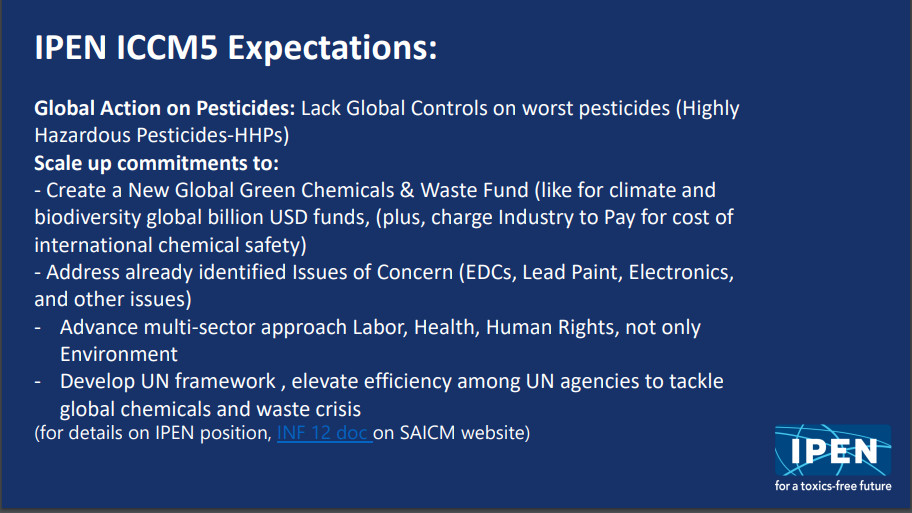
IPEN | Perspectives for ICCM5: towards a new instrument on chemicals and waste beyond 2020
Marcos ORELLANA | UN Special Rapporteur on toxics and human rights
- We are at a once-in-a-generation opportunity to craft a vision and a framework that addresses the toxification of the planet, an emergency situation as dire as the climate and biodiversity loss.
- When confronted with the evidence of the massive adverse impacts of chemicals on workers around the world, on declining male fertility rates and individual and collective intelligence coefficients or the number of premature deaths from air and water pollution, it seems to me we are a far cry from recognizing the global dimensions of the problem.
- While we have recognized the global environmental injustices that result from the toxification of the planet, a clear case in point is the double standards in the export of highly hazardous pesticides. The widespread and systematic infringement of human rights resulting from current affairs is simply untenable.
- ICCM5 is expected to deliver a robust framework and human rights are key to an effective and legitimate outcome. The vision of the framework needs to be anchored in human rights, particularly the right to science and the need to align measures to the magnitude of the threat that might arise in relation to such as circular economy if applied or implemented in ways that that harm workers or communities and the transfer of polluting recycling industries to the global South. The right to science is a safeguard against disinformation, brainwashing and the chasm that separates the measures that should be in place in regards to science. The right to a healthy environment and the promise that nobody gets left behind, which conflicts with the goal of minimizing significant adverse impacts as the normalizes the idea that some people will be harmed. Everybody has the right to a healthy environment so the vision should not regress from the Dubai Declaration and be supported by tools that articulate human rights the right to information.
- SAICM has been described as a safety net to catch issues that fall in the cracks of other multilateral environment agreements but the framework has not been able to prevent exposure.
- The universal periodic review of The Human Rights Council can offer important insights in terms of design. The toxification of the planet and Humanity demands bold and decisive action, making ICCM5 a historical step toward a more sustainable future.
Closing
Michel TSCHIRREN | Head, Global Affairs, Federal Office for the Environment, Switzerland
In these remaining days before we meet in Bonn for ICCM5, we, as the international community, must reflect on the fact that we have not reached the goal of minimizing the adverse effects of chemicals on human health and the environment. The new instrument that will result from ICCM5 must be able to reach this goal quickly and address current pressing issues. We must build on existing tools and grow in scope, in political commitment and take action quickly. Certainly, we must not fall behind SAICM and the Dubai Declaration, but we must adopt a better “SAICM plus” framework on chemicals and waste with relevance to many different types of stakeholders and sectors; we need to keep the work that was already done and not lose important progress that we have made. This also means keeping existing expertise and commitment and existing identified issues of concern.
Issues that are particularly pressing today are chemicals in products, endocrine-disrupting chemicals; highly hazardous pesticides; and nanotechnologies; among others. We need to progress and achieve SAICM goals, for instance by identifying and intensifying action instrumental for reaching specific targets and by including more stakeholders and channeling existing expertise in particular from the chemicals waste. Multiple organizations in Geneva have been working on the topic, diffusing and including in their work the latest scientific information. In the new global framework, it will be important to also allow the private sector to play a role. The new framework should be comprehensive to map the elements of sustainable chemicals in waste management so that the different stakeholders can address and contribute jointly to the issues and work towards these common goals. At ICCM5 actors will have to make efforts to come up with an ambitious consensus to lift existing brackets and to have the instrument ready for adoption. The adoption of the new global framework at ICCM5 is our possibility to jointly address over the next years world pressing issues that will determine the future of current and next generations
Highlights
Video
Live on Webex
Live in the room (part 1)
Live in the room (part 2)
Photo Gallery
Links and Documents
- Presentations made during the event
- Towards ICCM5
- Geneva addressing Hazardous Substances
- 5th session of the International Conference on Chemicals Management (ICCM5)
- Fourth meeting of the intersessional process considering the Strategic Approach and sound management of chemicals and waste beyond 2020 (IP4.3)
- IPEN Perspectives for ICCM5: towards a new instrument on chemicals and waste beyond 2020
- GENeva Environment Dialogues | SAICM & ICCM5 | Geneva Environment Network Event


